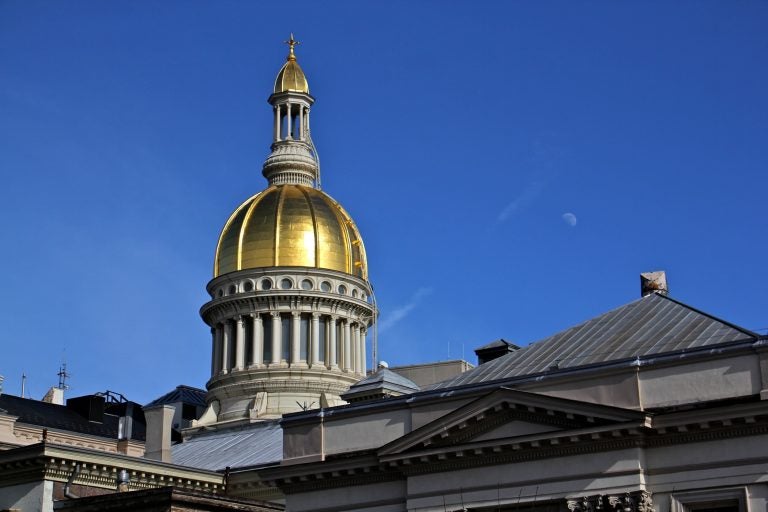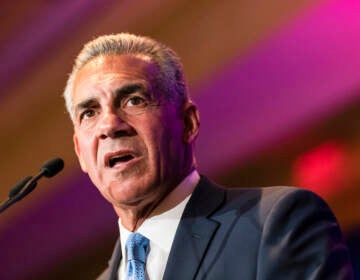As New Jersey examines wealth disparities, advocates say reparations should be on the table
The median wealth for white families in New Jersey was $352,000 in 2021. It was only $6,100 for Black families and $7,300 for Latino families.

New Jersey Statehouse in Trenton. (Emma Lee/WHYY)
Last September, New Jersey Gov. Phil Murphy signed an executive order establishing the state’s Wealth Disparity Task Force.
According to Murphy’s office, the task force “advises the Murphy Administration on strategies to address the various causes and effects of wealth disparity” in the state.
This summer, the group has gathered public input at a series of virtual hearings on a range of issues, including the state of the economy, criminal justice, and education.
Sheila Reynerston, a senior policy analyst with the New Jersey Policy Perspective, said the state has one of the largest racial wealth gaps in the nation. During a hearing last month, Reynerston submitted testimony imploring officials to consider tax reform that would increase taxes on the wealthy, end loopholes for corporations, and create a more progressive system of taxation on inherited wealth.
“I think that it’s becoming more and more common knowledge that the tax code is tilted towards those who are wealthy and well connected to policymakers,” Reynerston said. “Wealth disparities will continue to be extreme, as long as taxation remains to be very kind and soft on the very wealthy individuals and corporations who take advantage of existing loopholes and take advantage of an anti-tax rhetoric that has successfully convinced Americans that we should not like taxes.”
Reynerston supported a 2.5% business surtax on earnings over $1 million that the state enacted in 2018 and extended through the end of 2023. Officials should consider making the surtax permanent, she said.
Jean-Pierre Brutus, senior counsel with the New Jersey Institute For Social Justice, said he’s followed the task force since it was announced by the Murphy administration.
The institute has also backed a separate task force introduced by lawmakers in 2019 that calls for a statewide study of reparations over slavery.
The measure, reintroduced by Assemblywoman Shavonda Sumter (D-Passaic) in January, has yet to receive a committee hearing, despite elected leaders’ promises to reckon with race in meaningful ways since the nationwide unrest that followed the murder of George Floyd in 2020,
“The Wealth Disparity Task Force is important and welcome,” Brutus said. “But it’s not a replacement for a focused study of slavery and the lasting impact upon majority Black residents, which is what a reparations task force would do.”
Brutus said it’s important for the Murphy administration to distinguish between the two.
“Though [Murphy’s] Wealth Disparity Task Force executive order does lay out some of the necessary work ahead … it misses the moment by failing to take bold action, as the moment calls for which is calling for a reparations task force, and saying the word ‘reparations’ because we need to name the problem,” Brutus said. “The Wealth Disparity Task Force studies slavery, but it’s ancillary or on auxiliary, or is it marginal, it’s not the central area component of the study.”
Reynerston agreed with Brutus’ assessment that the state must address its legacy of slavery.
New Jersey had one of the largest enslaved populations in the North and was the last among northern states to abolish slavery.
“I really do believe that it’s state policies that are going to be the most effective way to establish reparations,” Reynerston said. “I really do believe that it has to come from that level, in terms of reversing decades of racist policies, redlining and segregation, and employment discrimination.”
According to the North Jersey Record, the median wealth for white families in New Jersey was $352,000 in 2021. It was only $6,100 for Black families and $7,300 for Latino families.
New Jersey remains one of the most segregated states in the nation, particularly as it relates to education. The state Supreme Court still has not decided on a landmark school desegregation case brought before the court in early March.
Upcoming virtual hearings for the Wealth Disparity Task Force can be found online.
WHYY is your source for fact-based, in-depth journalism and information. As a nonprofit organization, we rely on financial support from readers like you. Please give today.








